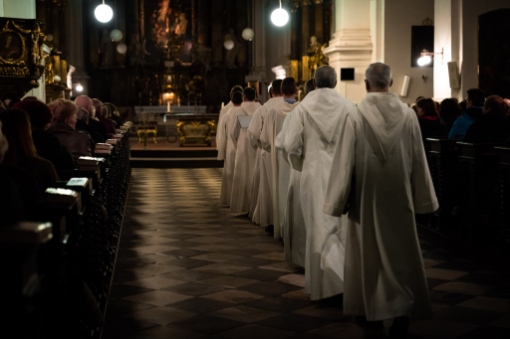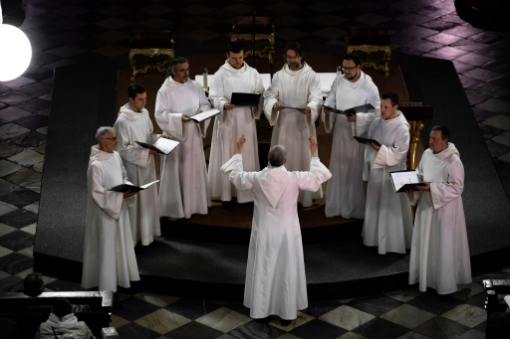Connection, unity, contemplation - these words can be used to describe the musical evening of Schola Gregoriana Pragensis under the direction of David Eben and organist Tomáš Thon, which took place yesterday as part of the Easter Festival of Sacred Music at the church of St. Thomas. Not only the singing of a Gregorian chant, but also the works of composer Petr Eben (1929-2007) enlivened the church space with sound and colour for an hour.
The first part of the concert belonged to the singing of a Gregorian chant referring to Palm Sunday. The introduction itself began in the sacristy, from which the choir made its way across the church singing the processional antiphon Hosanna filio David (Hosanna to the son of David). I appreciate the emphasis on the similarity to the liturgical rites and actions of Palm Sunday, which includes such a procession (e.g. the triple verse Tollite portas - Lift up the gates). A certain choreography and work with sound in the large space added plasticity to the interpretation and emphasised the liturgical aspect of the individual verses. The Schola Gregoriana Pragensis also included a small sample of the recitation of the St. Luke Passion (de Passione secundum Lucam), in which the audience was introduced to three singers in the roles of the narrator, Christ and other characters. The audience had the opportunity to hear the well-known Passion texts in their original, i.e. choral (sung) form. The theme of the Passion was concluded by the communio - the communion chant Pater si non potest , distinctive for its exclamation on the word Pater (Father) and the silence at the end of the verse ...fiat voluntas tua (Thy will be done). My only complaint would be the programme booklet, which usually contains all the texts and their translations. In the case of the Schola's concert, one could not help but notice that certain verses - for example, in the Gloria, laus - were superfluous, while in other songs verses were missing. I believe that for general listeners, for whom the printed and translated texts are a kind of guide or crutch in orientation, the booklet may have seemed confusing at times.

The block of one-voice singing was replaced by instrumental entries by Tomáš Thon - an organist and former student of composer Petr Eben. It was Eben's work that formed an imaginary counterpoint to the Gregorian chant repertoire and represented the field of 20th century music. However, it is questionable whether we can speak of a counterpart in Eben. Even in his spiritual or purely liturgical works, there are many references to old church modes or directly to choral chants, and therefore I see the combination of these two musical languages in one evening as dramaturgically successful. The organ sequence Mutationes was originally written for a situation where there are two organs in a church. Fortunately, the work can also be realised through one instrument using different, colour-rich registration. In this version, we could hear the sequence performed by Tomáš Thon, whose performance, despite the author's significant use of dissonances, dense chording and rhythmic articulation, was in the spirit of a cultivated stroke and a sense of sonic colour, which for most of the concert filled the entire space of the church of St. Thomas. In the contrasting sections focusing on the melodic side of the music and ornamentation, the organist demonstrated musical sensitivity and musicality in terms of a certain lightness and calm. These features in the organ part could also be noted in other vocal-instrumental pieces entitled Suita liturgica (1955-1960) and Missa Adventus et Quadragesimae (1951-1952) by the same composer. The first of these was composed as a setting of masses for Sundays and feasts, which is supplemented by organ (often concertante) interludes noticeably based on the melodies of the hymns. The Mass, which was sung at the end of the concert, bears a noticeable Gregorian inspiration and its liturgical designation as Advent and Lent is due to the omission of Gloria. The character is also enhanced by the predominance of the minor key (D minor) or the author's different conception of selected movements (such as the Sanctus) - Eben perceives this text more in the Old Testament sense in terms of the image of a mysterious inaccessible God.
The musical direction is without fault. Both in terms of voice, interpretation and content, it was a well-composed evening that offered the audience an immersion into the chants, thoughts and even their own prayers. This impression was especially noticeable due to the fact that the performers had no doubt about understanding the essence of the sung liturgical texts and then conveying the main ideas through sensitive and evocative delivery.
Programme:
Holy Week Hymns - Hosanna filio David, Gloria, laus, Tollite portas, Christus factus est, Pater si non potest, Calicem salutaris accipiam; de Passione secundum Lucam
Petr Eben - Mutationes for organ
Petr Eben - Suite liturgica (1st part: 5th Sunday of Lent): Make me right, Deliver me, Lord, I will praise thee
Petr Eben - Missa Adventus et Quadragesimae
Schola Gregoriana Pragensis
David Eben - Artistic director
Tomas Thon - Organ
Monday, 25 March 2024 at 7:30 pm, Church of St. Thomas

































No comment added yet..